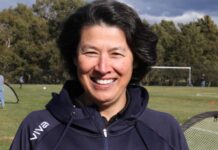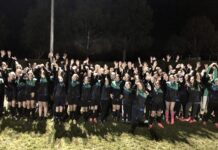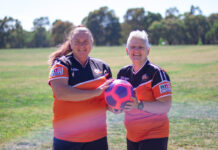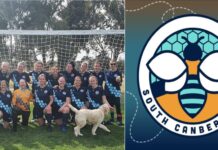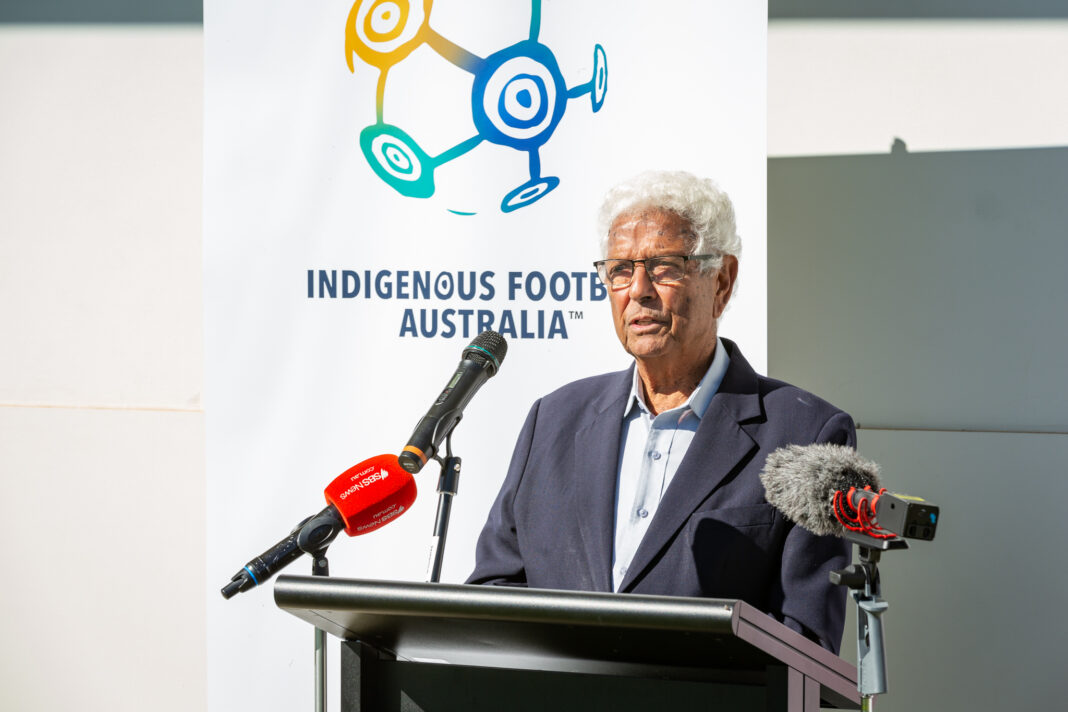
To mark the announcement of the launch of Indigenous Football Australia and the Moriarty Foundation’s new partnership with UNICEF Australia, the organisation’s co-founder and co-chair John Moriarty spoke to Ben Gilby about their work which introduces Indigenous Australian children to healthier lifestyles through football. It is a program which has already produced its first Young Matilda.
John Moriarty is an icon of Australia. Moriarty was the first recognised Indigenous Australian to be selected for the Socceroos, and he has also served in various Indigenous Affairs departments at both state and national levels of government, in addition to being a well-known Indigenous Australian artist.
Moriarty outlined the background of the Foundation and a brief overview of the work they do.
“Moriarty Foundation is an Aboriginal-established foundation that enables Aboriginal families and communities to unlock their children’s potential. By embracing the Aboriginal worldview, its locally-led solutions are radically shifting intergenerational disadvantage.
“Established in 2011, Moriarty Foundation delivers two ground breaking and interrelated community initiatives in remote and regional Australia, Indi Kindi and John Moriarty Football.
“John Moriarty Football (JMF) is a transformational skills mastery program for 6-18 year olds that uses football for talent and positive change, improving school attendance and achieving resilient, healthier outcomes in Indigenous communities.
“Each week JMF reaches more than 1,500 children, with equal participation of boys and girls in eighteen communities across New South Wales, Queensland and the Northern Territory through in-school and after-school sessions, free school holiday clinics, weekend tournaments, and in juvenile justice facilities.”
“JMF is community-led and guided by local Community Advisory Groups.”
With the programme reaching so many children each week, I asked Moriarty how many staff and coaches were involved in delivering their programs in these remote communities.
“JMF has a 50/50 male/female employment policy and has thirty-five staff members of whom 63% are Indigenous. JMF staff are empowered to build their skills and qualifications through mentoring, formal coach education training and licensing, safe food handling, first aid accreditation and physical and mental health education.”
It is important to note that JMF is not just about football – it’s about improving health and lifestyle choices as Moriarty underlines.
“JMF is a holistic initiative that encourages regular school attendance, healthier lifestyles, self-respect and community engagement through football and teamwork.
“At each session, we provide access to nutritious meals and snacks. Our meals are designed by a sports dietitian and include nutrients that are often lacking from Aboriginal children’s diets in our communities.”
“We provide wellness education and modelling, covering nutrition, sleep, exercise and self-calming strategies. An example of this is our breathing exercises. Every JMF session either starts or concludes with regulated breathing exercises, as well as clench and release techniques. This is intended to be a progressive practice for each individual to improve their self-emotional regulation and learn practical techniques they can use when they are stressed. By teaching emotional self-regulation strategies, we aim to build resilience and capacity in communities where stress and trauma are major contributors to disadvantage.
“In addition, through our partnerships with local health networks, we provide vital health information our young participants need.”
The program starts with children as young as two years-old in their Indi Kindi activities. John enlarged on what these sessions are like for the young children.
“Linked to our successful Indi Kindi program, Indi Footi is a pre-school football program for two to six year olds. Delivered by our JMF coaches, Indi Footi activates young brains through movement and develops basic football and motor skills, balance and coordination in a fun, non-competitive environment. Sessions focus on fun, discovery-based football activities as well as health and wellbeing components, like breathing exercises to begin to introduce ways to self-calm.”
In terms of wider opportunities for older children, JMF also offer scholarships for indigenous children between the ages of ten to eighteen.
“Our JMF Scholarships & Pathways Program begins with our Community Scholarship initiative for select participants of our JMF program in regional Indigenous communities who show exceptional talent and desire to do well at school. We support these scholars with one-on-one training, tutoring and mentoring, equipment and stationery for school, a placement with a JMF-partnered football club in the area, football equipment and travel support.”
“We also offer Sydney Scholarships to support JMF scholars to attend some of Australia’s top schools and undertake intensive football training in Sydney.
“We work in partnership with schools, like SCEGGS Darlinghurst, Westfields Sport High School and St. Catherine’s School, as well as NPL football clubs (top tier State league clubs) to provide these talented children with an opportunity to pursue both a great education and advanced football development.”
The success of the program has helped to develop players who have gone on to regional and representative football, one of whom is already starting out on her W-League career, as Moriarty highlights.
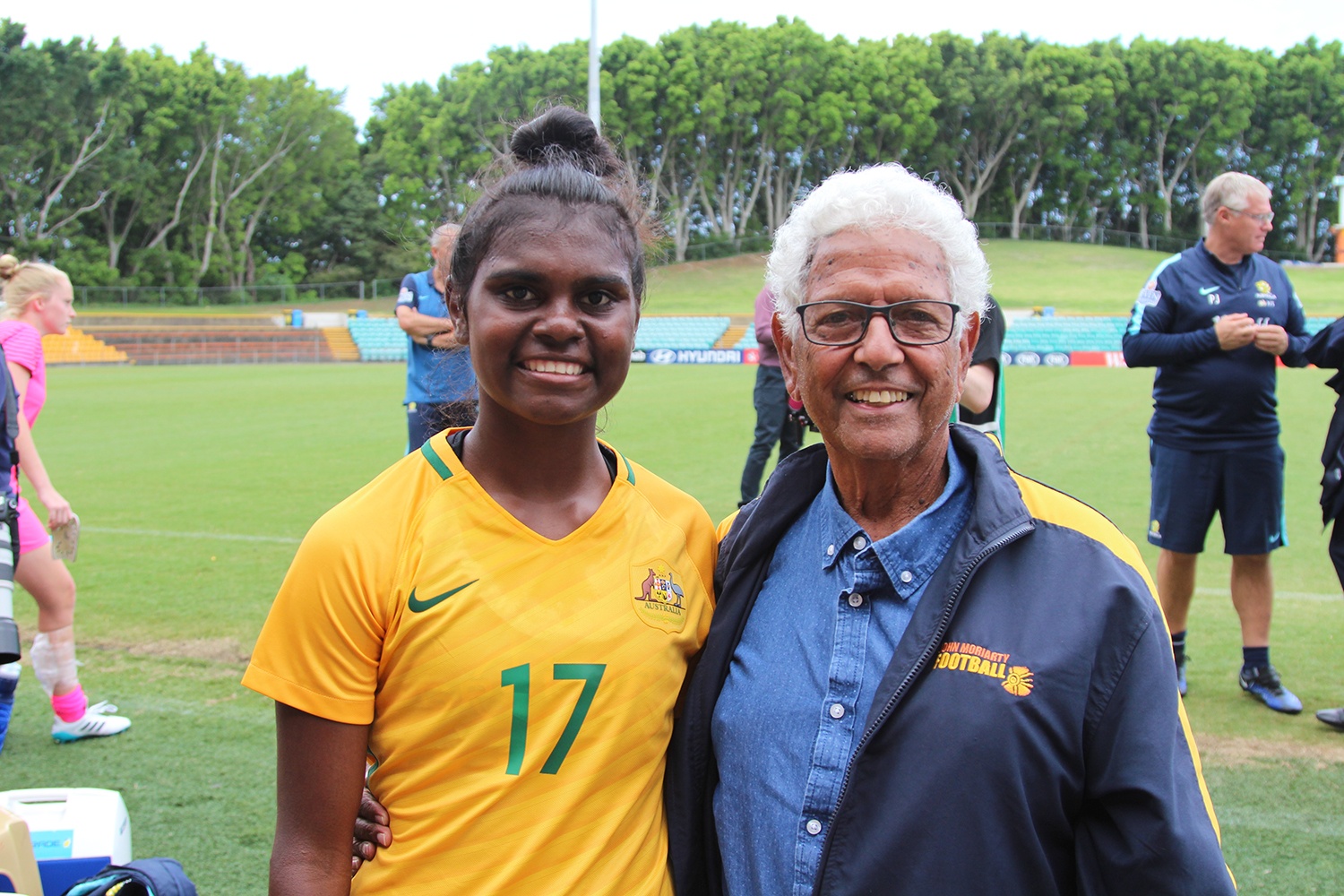
“The Scholarship Program’s inaugural scholarship holder, Shadeene (Shay) Evans, went on to sign with W-League side Sydney FC, was selected as a Young Matilda and named vice-captain. Additionally, Shay was awarded the 2020 Role Model of the Year by Football Federation Australia.”
In recent times, Lydia Williams and Gema Simon (two players with indigenous heritage) have played for the Matildas, while Jada Mathyssen-Whyman has been a high profile player domestically since a very young age. Some of Australia’s biggest-name Indigenous women players are actively involved in supporting JMF.
“Players like Jada Whyman and Gema Simon are frequent guests of our JMF school holiday clinics that are run each school holiday period throughout our hubs,” said John. “They get involved in running sessions, games, sharing their knowledge and having fun. Jada was also an ambassador for Indigenous Football Week in 2020.”
With Australia having some of the world’s tightest external and internal border restrictions since the onset of the coronavirus pandemic, I wondered how it had impacted on JMF’s activities.
“In 2020 when Australia went into lockdown our physical delivery was interrupted, however, we were still able to deliver our program virtually utilising videos and social media. Thankfully, as regional and remote areas came out of lockdown we recommenced full delivery in all our hubs observing COVID-safe guidelines.”
The JMF has recently launched a new national body, Indigenous Football Australia, to expand its Closing the Gap solution and reach thousands more Indigenous children across Australia.
Also announced was a major partnership between UNICEF Australia and Moriarty Foundation, which has been two years in the making. The two organisations will cooperate through global exchange, knowledge sharing and community-driven advocacy.
Among those attending the launch were Wiradjuri and Yorta Yorta woman, Jada Whyman (W-League player and recently appointed JMF Scholarship Mentor) as well as Marra woman, Shadeene Evans (Young Matilda and inaugural JMF Scholarship holder).
John emphasised that: “The IFA’s aim is to extend our platform even further to bring the benefits of John Moriarty Football to Indigenous children, families and communities right across Australia.
“Our partnership with UNICEF Australia will amplify our impacts exponentially.
“JMF meets 11 of the 16 Closing the Gap targets and is the initiative is currently offered in 18 different communities in the Northern Territory, Queensland and New South Wales, at a cost of just $1,300 per child per year.
“The IFA’s nationwide expansion will provide over 3,600 Indigenous school-aged children each week with access to a transformational football and wellbeing program as well as increasing our footprint from 18 to 36 remote and regional Indigenous communities in the Northern Territory, Queensland, New South Wales, South Australia, Victoria, Tasmania and Western Australia.”
“Additionally,” John continues, “it will increase JMF’s partnerships with public schools in remote and regional Indigenous communities from 15 to 42, by providing in-curriculum football sessions and creating new jobs for approximately 70 Indigenous people in remote and regional communities.”
John added, “Since launching in 2012 in Borroloola, a small community in remote Northern Territory, with 120 children JMF has kicked many goals. Over the past 18 months alone, our growth rate for participants is over 1,000 percent.
“We’ve taken children from the bush to Brazil for the 2014 FIFA World Cup, successfully expanded in three states, held five Indigenous Football Weeks, and launched the careers of several talented young footballers.
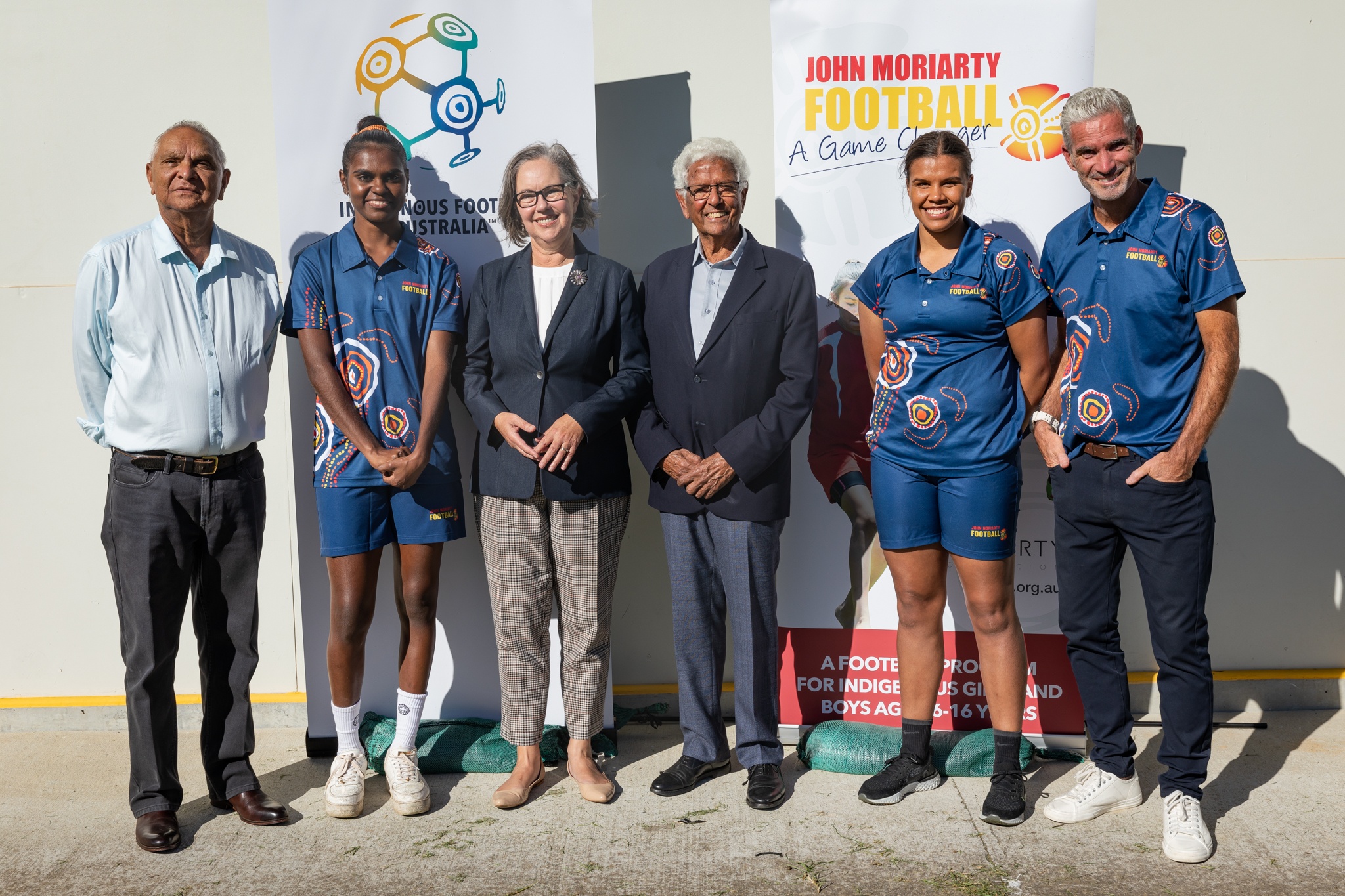
“Building on a decade of successful operations, JMF will reach all states to create more equitable access to the great game of football for grassroots and elite players, together with improved physical and mental health, wellbeing, education and community engagement for Indigenous girls and boys, families and communities.”
John concluded: “We are always asked by people all around Australia when JMF is coming to their community as they see the positive impact it has. We are very proud to be launching IFA and this nationwide expansion of JMF that will create more Indigenous-driven pathways and opportunities for our children, families and communities.”
The work of JMF is nothing short of inspirational and they are actively helping in changing young people’s lives, as well as helping to deliver the next generation of Matildas.
If you would like to donate to the John Moriarty Foundation, you can do so by visiting https://www.givenow.com.au/moriartyfoundation


